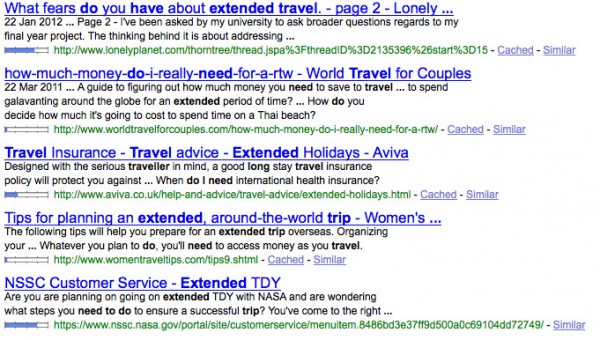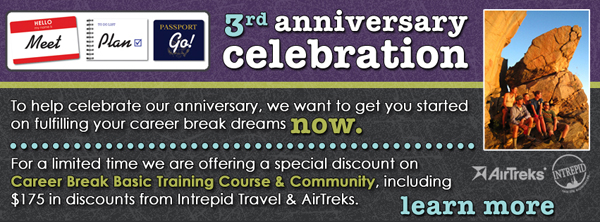“There was nothing scarier for me after the decision to travel around the world than the aspect of leaving my career.” — Warren Talbot of Married with Luggage
This is a frequent comment we hear from people contemplating career breaks. People take career breaks for different reasons – are you taking a break to change careers or explore new careers – or do you simply need a break? Granted, it’s not necessarily that simple, but you will need to examine deep down whether you want to leave your job behind or try to simply put it on hold while you take a career break.
There are endless possiblities on what can happen with your career when you take a break, but before you leave, you have to normally consider one of two things – quitting your job or trying to negotiate extended time off. We’ve pulled together some resources on both options and tips on how to handle them.
QUITTING
If you think you want to cut ties with your current job, then go about it carefully. Consider how much notice you need to give, and always keep in mind that burning bridges is never a good solution. We’ve met career breakers who actually quit their jobs to travel for a year and then were actually hired back by the company when they returned. Even though you may not want to work for your company or your boss again, you may need their assistance when you return in building up your network, contacts, and references when looking for a new job. You know your company culture the best, so really think about how much notice you need to give, and how you will explain to them why you are leaving. Always try to put a positive spin to why you are leaving.
What’s the best way to go about quitting – here’s a few tips from how Warren on how to leave your job gracefully.
- When you give notice, provide your boss with recommendations for how you will spend your remaining time. Let them know you will remain motivated to work hard. Talk about helping to recruit your replacement and get them trained and up to speed before you leave.
- Make sure to focus the discussion about your desire to explore the world. Do not turn this into your opportunity to explain all the ways they have disappointed you in your career. Remember, you may want to get back together with this partner.
- Read your situation – every scenario is different, so be sure to have an idea at how your boss will take the news. Be prepared for the worst case scenario (walked to the parking lot and start your trip earlier than expected), but plan for the best. Provide you employer with reasons why keeping you on is going to be good for them.
- Always keep the door open to the future. For most people, this is a “career break”, and as such there is at least a “plan” to return to the corporate world. Keeping your options open and remaining flexible is generally a good strategy. Make sure that you could return to the company if possible.
- Not everyone will understand – this is something I faced immediately after giving notice. People simply could not grasp why I would even consider doing “something this stupid”. It is inevitable you will come across this at work and will spend many hours trying to explain. This is normal. What you are doing is odd (sadly), but you are following your dream and your heart. Explain why you came to the decision, and remember why it is so important to you. Your career will likely be there if/when you return.
Read about what happened to Warren a year after being on the road.
Even the best-laid plans of giving notice don’t always go as anticipated and you may have to adapt your plan quickly. Watch what happened to career breaker Val Bromann when she decided to give notice.
Want to see where Val ended up…well…she’s still traveling and now doing freelance work – check out her website here!
SABBATICALS OR UNPAID LEAVE
A sabbatical is simply getting an extended leave from work to pursue a break. The first thing to do if you think you want to take a sabbatical is to do your research. Find out if your company offers any type of sabbatical or leave program. Many times companies offer these, but they aren’t necessarily publicized, so don’t be afraid to dig into your HR manual or sit and have a talk with your HR rep to learn exactly what the options may be.
Granted, your company might not have a formal sabbatical program, but consider the fact that you can lead the way in requesting a sabbatical and having them start such a program. You get nothing if you don’t ask.
Sherry Ott interviewed Barbara Pagano, who wrote the ebook Negotiating Your Sabbatical, to get some tips on the steps to approaching your employer about taking a break. In addition she shares advice on deciding quit vs. sabbatical, and tips for job hunting when you return.
BARBARA PAGANO INTERVIEW (Part 1 Runtime – 14:23)
Interview transcript:
- 1:00 – Barbara took her own sabbatical – what did she learn?– Reset the ‘challenge meter’; found that challenges in business seemed to be less of a challenge any longer.– Improved decision making skills – they are extraordinary now!– Need to have confidence in selling your career break experience.
- 3:53 – How can you decide whether to quit your job vs. asking for a sabbatical from your job?– You need to look at your long-term career goals.– In this economy it’s the best time to negotiate a sabbatical.
- 5:55 – Why do some companies offer sabbaticals?– More are ‘getting it’ – Large and small companies are looking at sabbatical programs as a way to develop the talent of their employees.– The company benefits by seeing just what kind of leadership they have in the pipeline and it develops your employers further. More and more companies area looking at it as talent development.
- 8:03 – What are some tips for negotiating a sabbatical at a company who doesn’t normally offer one?– Understand the pre-work you need to do before you go in and talk to your boss.– Know who else is giving sabbaticals and why they are doing it. It allows you to talk intelligently about sabbatical programs. Arm yourself with knowledge.– Understand what you are good at and what you need to strengthen. Determine this before you decide what you want to do on sabbatical.– Treat it seriously and formulate your business proposition. It’s not about you, it’s about the company and how they can benefit.– You have to educate people! In addition, put it all in writing so that you can talk intelligently about it with your boss.
- 12:14 – How long of a sabbatical should/can you try to ask for?– The average sabbatical occurs about every 5 years for a minimum of 4 to 6 weeks. The average sabbatical is 1 to 3 months in length.– It also depends on how long you’ve been with the company. Know that a sabbatical should not be a one shot experience; they should be interspersed throughout your career.
BARBARA PAGANO INTERVIEW (Part 2 Runtime – 13:45)
Interview transcript:
- 1:00 – If you are looking for a job change, then look for companies who value the idea of breaks/sabbaticals.– Look on YourSabbatical.com for a list of companies that support sabbaticals.
- 2:00 – Can anyone ask for a sabbatical no matter what their position? Is it more difficult if you are not a company leader?– Try to link your sabbatical to your company’s values. Alignment is key.– Consider how the current conversation in the company potentially applies to the break you want to take. Find ways to benefit the company – no matter what level you are at.
- 4:25 – If you do want to actually leave your job and take a break (as opposed to a sabbatical), then you can still use all of the research you’ve done and incorporate it into your resume when looking for a new job.
- 5:40 – Should you hide the fact that you left your job to take a break? No!
- 6:05 – Tips for job hunting: Make sure you negotiate a sabbatical into your new job if you are changing jobs.
- 6:50 – Can you negotiate unpaid sabbaticals or with other perks?– If you are willing to take an unpaid sabbatical, then negotiate benefits and securing your position when you return.– Some companies use unpaid sabbaticals to alleviate costs.
- 9:52 – Look at your sabbatical as a standard negotiation – start high and know how low you are willing to go.
- 10:15 – What do you do if it doesn’t work? You have planted the seed and let people know that it’s important to you as an employee.
- 11:28 – Don’t look at your sabbatical as a gift that the company gives you. Instead look at it as a company developing and keeping talent in a company therefore making the company successful in the future.
What is your plan? Quit vs. Negotiate Time off? Have any tips to share?





 Your biggest single expense is going to be your airfare. Buying a
Your biggest single expense is going to be your airfare. Buying a  Trying to figure out a budget for food can be a bit difficult. Many websites and guidebooks out there give you a pretty decent breakdown for food costs in the regions you plan on traveling in, but many are a year or more out of date, so always be sure to aim high. Food costs can vary wildly depending on many factors, and while some travelers can easily get buy on less than $5/day for food in many parts of the world, it takes some determination and creativity.
Trying to figure out a budget for food can be a bit difficult. Many websites and guidebooks out there give you a pretty decent breakdown for food costs in the regions you plan on traveling in, but many are a year or more out of date, so always be sure to aim high. Food costs can vary wildly depending on many factors, and while some travelers can easily get buy on less than $5/day for food in many parts of the world, it takes some determination and creativity.

 Sometimes the most overwhelming part of the budget is figuring out where to begin. If you don’t already track your spending, then start now!
Sometimes the most overwhelming part of the budget is figuring out where to begin. If you don’t already track your spending, then start now! Once you get to the point where you are bringing in more than you are spending, then it’s time to go into saving mode. Open up a savings account somewhere. Research banks that offer high starting interest rates or specials for the first year. Any extra little bit helps. Then start paying that savings account, otherwise known as your career break travel fund, as you would your normal bills. Figure out how much you can start putting away each month, and pay it as soon you receive a paycheck.
Once you get to the point where you are bringing in more than you are spending, then it’s time to go into saving mode. Open up a savings account somewhere. Research banks that offer high starting interest rates or specials for the first year. Any extra little bit helps. Then start paying that savings account, otherwise known as your career break travel fund, as you would your normal bills. Figure out how much you can start putting away each month, and pay it as soon you receive a paycheck.






